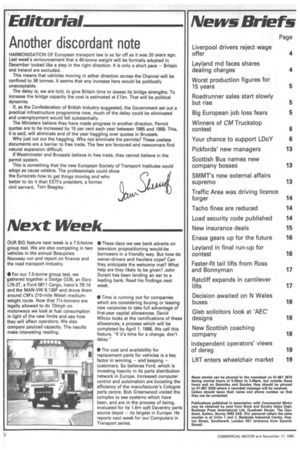Another discordant note
Page 4

If you've noticed an error in this article please click here to report it so we can fix it.
HARMONISATION OF European transport law is as far off as it was 20 years ago. Last week's announcement that a 40-tonne weight will be formally adopted in December looked like a step in the right direction. It is only a short pace — Britain and Ireland are excluded.
This means that vehicles moving in either direction across the Channel will be confined to 38 tonnes. It seems that any increase here would be politically unacceptable.
The delay is, we are told, to give Britain time to assess its bridge strengths. To increase the bridge capacity the cost is estimated at fl bn. That will be political dynamite.
If, as the Confederation of British Industry suggested, the Government set out a practical infrastructure programme now, much of the delay could be eliminated and unemployment would fall substantially.
The Ministers believe they have made progress in another direction. Permit quotas are to be increased by 15 per cent each year between 1985 and 1989. This, it is said, will eliminate end of the year haggling over quotas in Brussels.
Why just cut out the haggling. Why not eliminate the permits? These useless documents are a barrier to free trade. The few are favoured and newcomers find natural expansion difficult.
If Westminster and Brussels believe in free trade, they cannot believe in the permit system.
This is something that the new European Society of Transport Institutes could adopt as cause celebre. The professionals could show the Eurocrats how to get things moving and who better to do it than ESTI's president, a former civil servant, Tom Beagley.












































































































